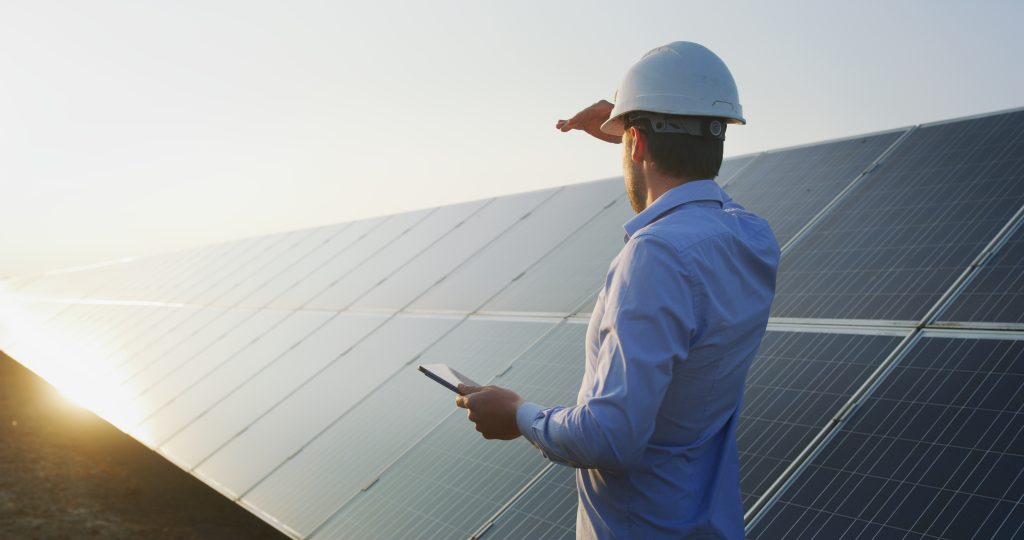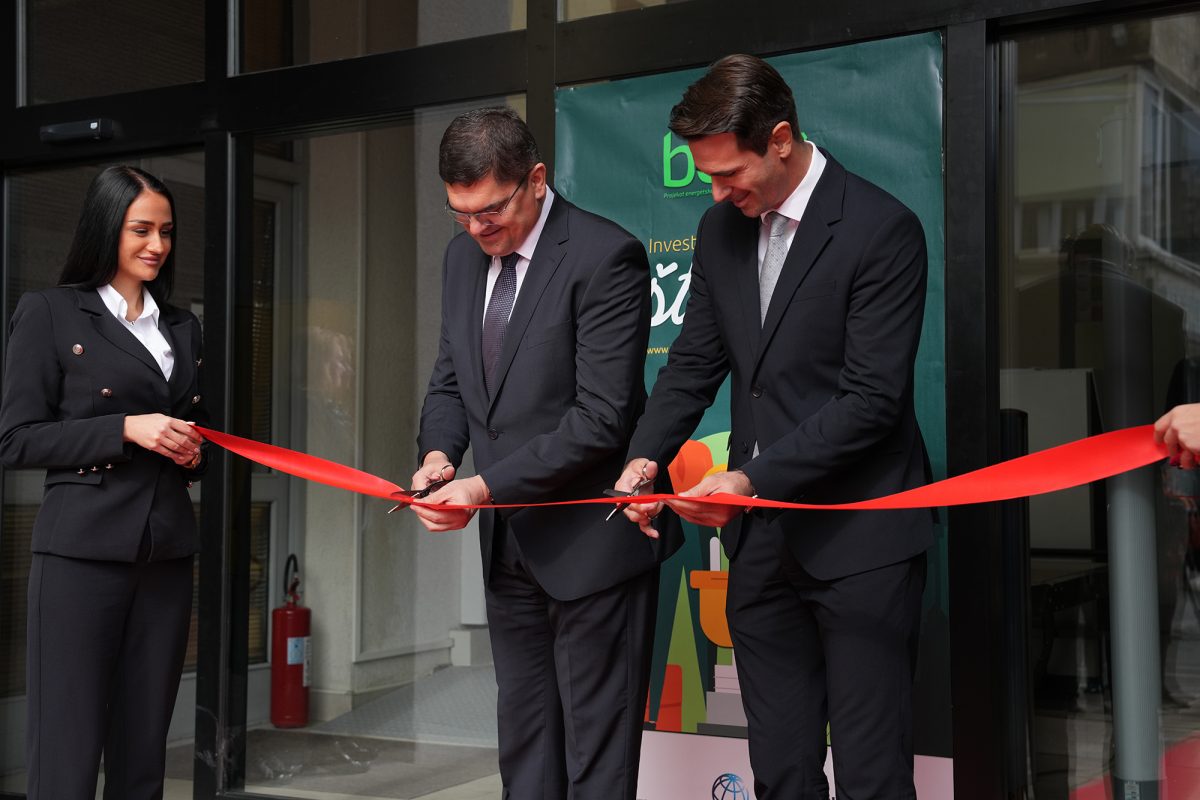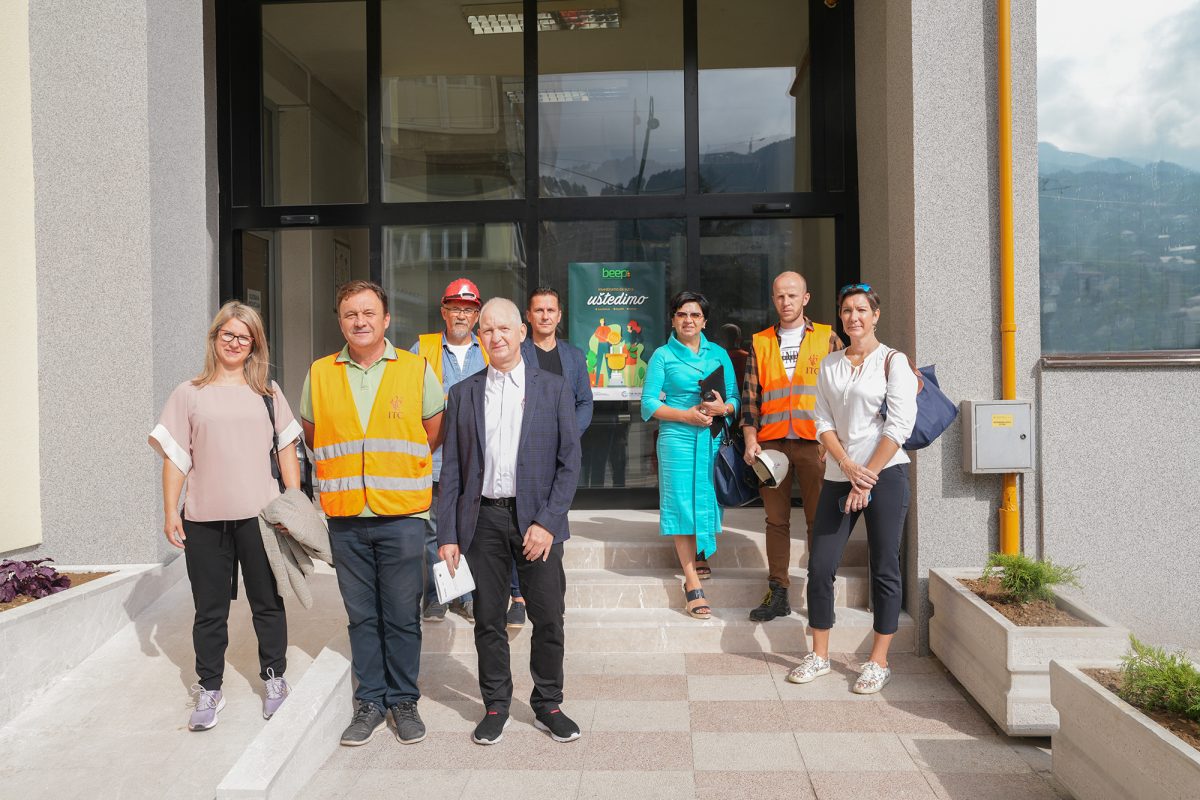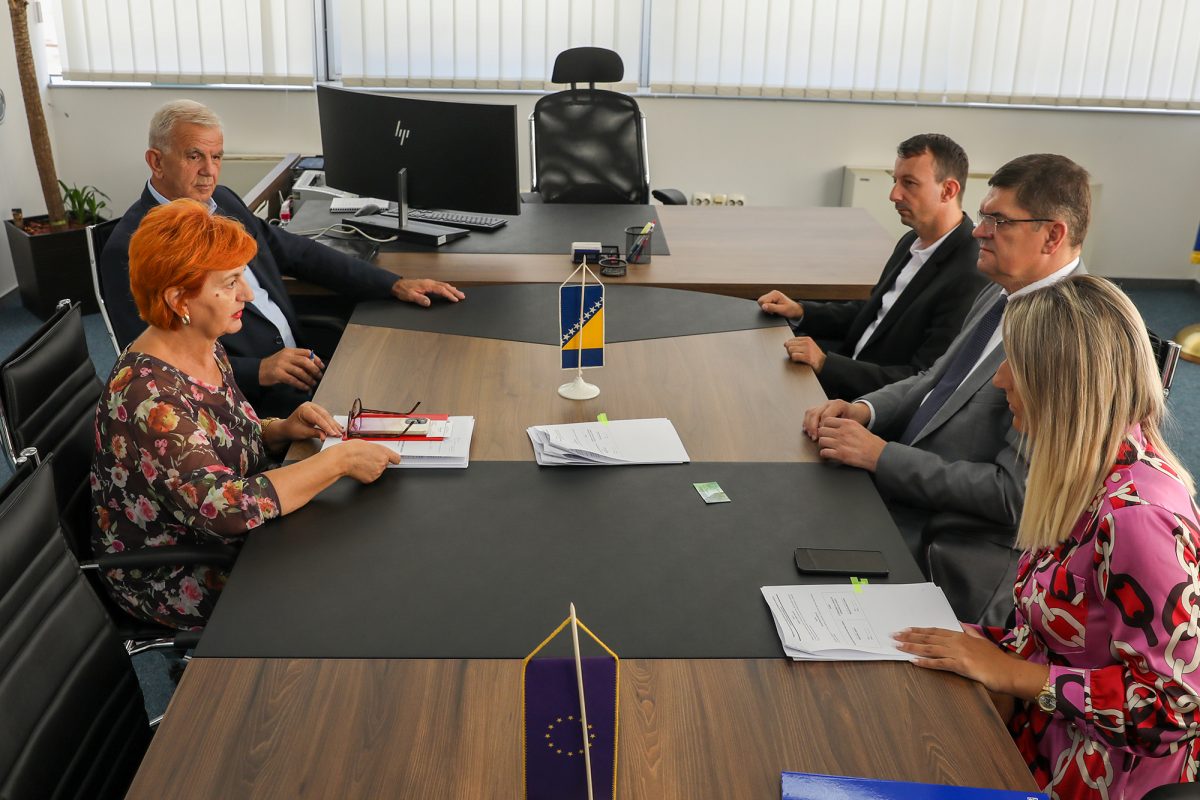Category: ad
Symbolic Marking of the Completion of Works on the Implementation of Energy Efficiency Measures at the Building of Judicial Institutions of FBiH as Part of the Energy Efficiency Project for Bosnia and Herzegovina (BEEP)

In Sarajevo, a symbolic ceremony marked the completion of works on implementing energy efficiency measures at the Building of Judicial Institutions of the Federation of Bosnia and Herzegovina. This is one of the 20 public purpose buildings in Sarajevo Canton where energy efficiency measures have been implemented within the framework of the “Energy Efficiency Project for Bosnia and Herzegovina” (BEEP) and Additional Financing AF BEEP, which has been implemented since 2015. The project has enabled the renovation of 89 public buildings, focusing on health and educational institutions.
On this occasion, the Minister of Spatial Planning Željko Nedić pointed out: “According to the available data, the average energy consumption in public buildings in Bosnia and Herzegovina is three times higher than the average of the European Union (EU), which categorizes them as energy inefficient buildings. According to the preliminary registry, currently implemented by the Ministry, there are more than 4,000 public purpose buildings in the Federation of Bosnia and Herzegovina, and energy efficiency measures need to be implemented for more than 50% of these buildings. This represents a significant potential for energy savings and creating better conditions for the users of the buildings.”

As part of this project, the Building of Judicial Institutions of the Federation of Bosnia and Herzegovina was renovated with a focus on energy efficiency, which resulted in an investment of about two million one hundred and forty thousand KM. The expected annual energy savings in this facility after implementing the measures amounts to 613,538.00 kWh/year, which will result in a significant reduction of CO2 emissions of 270 tCO2/year.
“The Energy Efficiency Project for Bosnia and Herzegovina (BEEP) achieved more than the simple renovation of a building. This renovation made it possible to improve comfort for all users of the institutions located in this facility. The facilities where we work should not only be spaces for conducting work, but places where people feel comfortable and motivated to give their best,” stated Vedran Škobić, Minister of Justice.

By implementing energy efficiency measures at the Building of Judicial Institutions of the Federation of Bosnia and Herzegovina, better conditions are provided for the daily stay and work of 265 facility users. The works were conducted in accordance with world standards in energy efficiency, including thermal insulation of facade walls, replacement of carpentry and locksmithing, thermal insulation of the roof, and replacement of existing lighting and heating with energy-efficient solutions.
BEEP is the largest energy efficiency project in Bosnia and Herzegovina, implemented with World Bank loans. The project is being implemented from 2015 to 2024 with the goal to present the advantages and sustainability of energy efficiency. About 563,000 users of facilities in the public sector will have multiple benefits from the increase in energy efficiency. Through the implementation of the project activities, a reduction of CO2 emissions of almost 12,000 tons per year is expected, while the desired annual energy savings amount to over 34,000 MWh. Also, this project supports Bosnia and Herzegovina in fulfilling its obligations from the Energy Community Agreement, which committed itself to implementing the EU directive in energy efficiency.
Implementation of energy efficiency measures at the building of Judicial Institutions of FBiH in Sarajevo
The World Bank supports the sustainable future of Bosnia and Herzegovina
The Energy Efficiency Project for Bosnia and Herzegovina (BEEP and Additional Financing for BEEP) is being implemented since 2016, and so far 89 public buildings have been renovated within this project, comfort has been improved for about 563,000 users and 2,300 green jobs have been created.

On this occasion, the World Bank delegation today visited the building of the Judicial Institutions of the FBiH in Sarajevo, which is one of 20 public buildings that have undergone the process of implementing energy efficiency measures as part of the Sarajevo Canton Project, in which 14 million BAM were invested. The project “Energy Efficiency for Bosnia and Herzegovina” (AF BEEP) is financed through loans from the World Bank, and the results achieved by the project in the period from 2016 to 2023 are the best example of good synergy between the ministry, project team and investors. About 2,140.000 BAM was invested in the renovation of the building of the Judicial Institutions of FBiH. The expected annual energy savings in this facility, after the implementation of the measures, amounts to 613,538.00 kWh/year, which will result in a significant reduction of CO2 emissions of 270 tCO2/year. The total area of the building of the Judicial Institutions of FBiH is 5,725 m2. By implementing energy efficiency measures, at the same time, better conditions were ensured for the daily stay and work of 265 users of this educational institution.

The works were carried out in accordance with world standards in the field of energy efficiency, and included various measures, from thermal insulation of facade walls, partial replacement of existing carpentry/lockwork, thermal insulation of the roof, along with replacement of the covering, installation of a central space cooling system, with the installation of a new pipe network and installation of valve convectors, replacement of existing boilers with more energy efficient ones, as well as partial replacement of lighting fixtures. This investment aims to reduce energy consumption in public buildings, contribute to the economic sustainability of current energy costs and reduce CO2 emissions. The BEEP project represents an important step towards improving energy efficiency and sustainability in Bosnia and Herzegovina and contributes to the goals of ecological sustainability and better working conditions in public institutions.

The World Bank delegation, together with the Federal Ministry of Spatial Planning, will continue to monitor the implementation of energy efficiency measures to ensure the further progress of this important project for Bosnia and Herzegovina. By implementing the activities within the BEEP and AF BEEP projects, it is expected that CO2 emissions will be reduced by more than 12,000 tons per year, while energy savings on an annual level amount to more than 34,000 MWh.

Implementation of energy efficiency measures at the building of Judicial Institutions of FBiH in Sarajevo
Investment Worth Over 1.8 Million BAM
Federal Minister of Spatial Planning Željko Nedić has signed contracts with contractors, marking the beginning of construction activities on two public-purpose buildings. The agreement covers the facilities of the Federal Institute of Agriculture in Sarajevo and the Building of the Government of the Federation of Bosnia and Herzegovina in Mostar.

The construction work is set to commence in September, funded by the Revolving Fund for Energy Efficiency, established by the Government of the Federation of BiH in May 2021 as a self-sustaining financial mechanism to collect and manage funds for implementing energy efficiency measures in public-purpose buildings in the Federation of Bosnia and Herzegovina. Through the Revolving Fund, the Federal Ministry of Spatial Planning has secured funds for the renovation of public-purpose buildings included in the Operational Plan for Improving Energy Efficiency in the institutions of the Federation of BiH. The main objective of this plan is to primarily reduce energy consumption for heating in public-purpose buildings in the Federation of BiH, leading to budgetary savings, decreased use of fossil fuels, preservation of natural resources, and ultimately, reduction of global warming through the decrease in emissions of harmful greenhouse gases into the atmosphere. The renovation of the first two facilities will involve an investment of more than 1.8 million Bosnian Marks (1,868,715.27 BAM).
“From 2016 to 2023, we successfully implemented the BEEP and AF BEEP projects, during which energy efficiency measures were implemented in 88 public buildings, with an investment of around 46 million BAM. The expected annual savings exceed 34,000 MWh, with a reduction of CO2 emissions by over 12,000 tons annually. Comfort has been improved for approximately 563,000 users, and around 2,300 green jobs have been created. After achieving these significant results, we continue through the Revolving Fund for Energy Efficiency of the Federation of Bosnia and Herzegovina for public-purpose buildings. These are the first two facilities whose renovation will be financed thanks to this fund,” highlighted Željko Nedić, Minister of the Federal Ministry of Spatial Planning.
The construction work on the Government of the Federation of BiH building in Mostar will be carried out by the consortium “GRADNJA d.o.o. Mostar and IZGRADNJA TOJAGA Export-Import d.o.o. Mostar.” In contrast, the consortium will handle the Federal Institute of Agriculture facility of FBiH in Sarajevo: “UNIGRADNJA d.o.o. Sarajevo and INTERKLIMA d.o.o. Sarajevo.” For the Mostar facility, thermal insulation of the façade walls and reconstruction of the flat roof is planned, along with the replacement of existing locksmith works, partial replacement of lighting fixtures, and improvement of the thermal-technical system with the installation of a heat pump. The total investment value, including VAT, is 1,075,698.00 BAM.
Funds amounting to 793,017.27 BAM have been allocated for the Federal Institute of Agriculture of FBiH building in Sarajevo, to be used for thermal insulation of the facade, replacement of windows and doors, installation of thermostatic valves, improvement of the thermal-technical system, replacement of existing boilers, and partial replacement of lighting fixtures. As part of the BEEP and AF BEEP projects, 25 public-purpose buildings have been renovated in the Herzegovina-Neretva Canton, with a total investment of 13 million BAM (13,587,144.04 BAM). In comparison, 19 public-purpose buildings have been renovated in Sarajevo Canton, with an investment of nearly 12 million BAM (11,955,881.31 BAM).
Light Up Your Space Sustainably

In today’s world, more and more people recognize the importance of using renewable energy sources to reduce their dependence on fossil fuels and minimize their negative impact on the environment. One way to contribute to a more sustainable lifestyle is by utilizing solar lighting to illuminate your yard, pathways, or garden.
Solar lighting harnesses the power of the sun to charge batteries that power the light sources during the night. This system relies on solar panels that absorb sunlight and convert it into electrical energy. Throughout the day, the solar panels charge the batteries in the lights, illuminating the space at night.
There are numerous advantages to using solar lights. Firstly, solar lighting is energy-efficient as it utilizes a renewable energy source – sunlight. It doesn’t require a connection to the electrical grid, meaning you won’t have additional electricity costs. Additionally, solar lighting is easy to install as it doesn’t involve digging cables or hiring electricians. You can effortlessly set up solar lights and relocate them as needed.
Another advantage of solar lights is their flexibility in terms of placement. Since they are not connected to the electrical grid, you can place them anywhere in your yard, garden, or pathways. This allows you to illuminate dark corners of your yard or highlight ways in a practical and aesthetically pleasing manner. Solar lighting can create a pleasant ambiance in your space and provide safety during nighttime hours.
Solar lighting is also an environmentally friendly option. By using solar energy instead of fossil fuels, you reduce greenhouse gas emissions and minimize your impact on climate change. Through these small yet significant steps in utilizing renewable energy, you contribute to conserving natural resources and creating a more sustainable environment for future generations.
Use Cold or Lukewarm Water Whenever Possible

Hot water often represents a significant portion of overall energy consumption in our households. Fortunately, there is a simple way to reduce this consumption and achieve substantial savings. The key is to minimize the use of hot water for laundry and dishwashing and instead use cold or lukewarm water whenever possible.
Suppose you’re wondering why. The answer is straightforward. It’s important to note that reducing the use of hot water positively impacts the environment. Using less hot water decreases the consumption of fossil fuels and greenhouse gas emissions that contribute to global warming.
Reducing the use of hot water is a simple and efficient way to lower energy consumption in your household. Here are some useful tips. By using less hot water for laundry and dishwashing, you can save energy bills significantly, prolong the lifespan of your appliances, and contribute to environmental preservation. Start implementing these simple changes and enjoy their benefits to your household and the planet.
Laundry is one of the daily activities in the household that typically involves the use of hot water. However, most modern washing machines now have a cold wash option. Using cold water instead of hot water can achieve excellent cleaning results while reducing energy consumption. Cold water is also gentler on fabrics, extending their lifespan. Reserve the use of hot or warm water only for heavily soiled laundry.
Similarly, dishwashing also requires hot water. However, many dishwashers have an eco-cycle option that uses less hot water and energy. If you wash dishes by hand, consider using a basin filled with cold or lukewarm water instead of running hot water from the tap throughout the entire washing process. You can use eco-friendly detergents that are effective even in cold water. If hot water is necessary, always control the temperature and avoid overheating it.
And lastly, but no less important, when brushing your teeth, avoid letting the water run continuously, as this can save more than a liter of water. These small changes in everyday activities contribute to significant savings and the preservation of our environment.
The heat pump is an ideal economic and ecological solution

After the Austrian capital recently announced that it will build the most significant and muscular heat pump in Central Europe by the end of 2023, which will heat 25,000 Viennese households, the public’s attention has just focused on the heat pump. This so-called “magical” pump will reduce carbon dioxide emissions in Vienna by as much as 40,000 tons per year. Even in Switzerland, every third new building is equipped with one of the different types of heat pumps; in Sweden, 7 out of 10 new buildings, and in Germany and Iceland, one quarter.
But what is a heat pump, and why has there been so much interest in it recently?
Namely, every individual in the 21st century desires to reduce energy costs and the climate footprint. That is why, as individuals, we choose an environmentally friendly source of energy, that is, one that draws power from nature. A heat pump captures solar energy stored in the ground where you live or in the air – and uses it to heat your home and domestic water. It is, as they say, an endless and accessible resource.
Unlike other renewable energy sources such as solar and wind energy, heat from the environment (earth, water, air) is available for non-stop use throughout the year. With a heat pump, without an additional energy source, it is possible to cover a house’s heat energy needs for heating and hot water (hot water preparation).
That’s why heat pumps represent a reliable, economic, and ecological heating system that, according to experts’ estimates, will be the leading heating and cooling method soon, and therefore savings.
For standardization, a unique COP coefficient (coefficient of performance = heating factor or heat multiplier) was accepted, describing the heat change ratio to the work input. If the heat pump has a COP of 4, it provides 4 kW of energy for every 1 kW of energy input.
If you’re heating your home, a heat pump will absorb heat from the outside (either from the air or the ground, depending on the model) and transfer it indoors. If you are cooling your home, the heat pump does the opposite, absorbing heat from the inside and moving it outside. For this heat energy transfer, much less energy is consumed than the transmitted energy, which ensures highly efficient heating and cooling.
Thus, for 1 kWh of electricity used to extract heat from renewable sources, energy from 3kW to 5kW is obtained at the output. In addition to heating and hot water, heat pumps can also cool, which is a significant advantage compared to traditional heating systems. Building a chimney is unnecessary, and only 1m2 is required for installation. It is independent of fossil fuels, and it is essential to emphasize that it contributes to reducing CO2, thus preserving our nature.
Conclusion: What are the advantages of a heat pump? Lower energy consumption means lower monthly costs and a quick return on investment. The quiet mode of operation, minimal and straightforward maintenance, and the long life of the device are just some of the benefits of the heat pump. In addition, we use one system to heat the space in the winter months and cool it in the summer.
Solar energy – clean and renewable

The production of energy from renewable sources is increasingly the focus of the interest of the Bosnian public, so the interest is growing among individuals who increasingly decide to install solar panels on the roofs of their houses.
Although installing solar panels is a significant investment, the return on investment is guaranteed and is most common in a few years after installation (5-6 years). This data should be a different estimate because the investment return time depends on several factors. Namely, solar energy has numerous advantages, but the most significant feature is the reduction of electricity or thermal energy costs and, ultimately, a positive environmental impact. After fully recovering the invested funds, the solar panels will work in your favor because you will have your energy for personal needs without additional costs.
Plate solar collectors convert as much as 95% of solar radiation into energy, and savings achieved by using solar systems for water heating purposes reach up to 70%. In households, savings primarily depend on the type of panels used and for what purposes, and the use of solar energy for space heating leads to savings of 20% to 35% annually.
The most important thing is that solar energy is good for the environment. Solar energy is known to be a clean, natural, and “green” form of energy. It reduces the level of pollution, and there is no way in which it negatively affects nature and the environment. It does not release harmful gases; apart from the need for water, it requires no additional resources. So, all that makes it extremely useful, and by using it, everyone is doing an excellent service to the environment, and that’s another important fact.
Many may need to learn that solar energy must not only be used to supply electricity but also for heating purposes. Various thermal systems will also use solar energy as heating solutions. This energy source is entirely free, inexhaustible, and available in unlimited quantities. Research has shown that solar energy emits much fewer greenhouse gases than fossil fuels; that is, it has a minor impact on climate change compared to other non-renewable energy sources.
There are several other benefits of using solar energy, such as the fact that you will protect yourself from future increases in electricity prices because you will have a cheap and excellent source of energy that you do not have to pay anyone. Every house that uses solar energy functions like a small power plant, and the entire environment will receive a higher level of safety and a significantly lower number of accidents and disasters caused by human errors.
For the sake of interest, the fact is that 960 billion kWh of solar energy reaches the earth’s surface daily and that, in theory, it can meet the energy needs of the world population for the next 180 years. It is clear what the potential of this energy source is. Most of today’s energy solar systems do not require much maintenance and therefore do not cause high maintenance costs. Solar panels used for household purposes only need cleaning a few times a year.
And remember that solar energy is available worldwide because every part of the planet is affected by solar radiation. Some features of the country have more sunny days and better prerequisites for using solar energy. Still, a fascinating fact is that Germany is far ahead of others in using solar energy and is considered to have the largest solar energy capacity in the world, thanks to investments, even though it is located north of the equator.
Energy efficiency becomes a reality at the University Clinical Hospital Mostar

Mostar, December 21, 2022 – The Energy Efficiency Project for Bosnia and Herzegovina (BEEP and Additional Financing for BEEP) has been implemented since 2015, and so far, 83 public buildings have been renovated within this project, with a particular focus on health and educational facilities. Institutions. Through the implementation of the Project, 2,150 green jobs have been created so far, and the comfort of stay has been improved for more than 563,000 users. By carrying out the project above activities, a reduction of CO2 emissions of almost 9,000 tons per year is expected, while the anticipated annual energy savings amount to nearly 31,716 MWh.
In Mostar, four facilities where energy efficiency measures were implemented were officially opened with a symbolic ceremony:
– Clinic for physical medicine and rehabilitation;
– Clinic for infectious diseases;
– Management of the University Clinical Hospital Mostar
– Clinic for internal diseases with dialysis center.
The Federation of Bosnia and Herzegovina Government invested more than 1.9 million KM in renovating these four buildings, and world standards carried out the works in energy efficiency.
“I am happy that we are continuing with the implementation of the Energy Efficiency Project for Bosnia and Herzegovina and the renovation of public facilities in the Federation of Bosnia and Herzegovina. The implementation of energy efficiency measures is significant in many ways. Primarily, we improve working and living conditions for all users of renovated buildings. The fact that medical workers will certainly have better working conditions is significant in itself. In addition, we achieve significant savings in energy costs. Research shows that investing one euro in energy efficiency in a short period brings a return of 4 to 5 euros, enabling a quick investment return. Finally, we also reduce air pollution, which is important for the health of society as a whole,” said Josip Marić, Federal Minister of Spatial Planning, on this occasion.

The implementation of energy efficiency measures on these buildings included: thermal insulation of facade walls, replacement of facade openings, thermal insulation of ceilings and roofs, including reconstruction of pitched and flat roofs, replacement of asbestos-cement covering with a new one made of profiled sheet metal, partial replacement of lighting fixtures, improvement of the central heating system, replacement boilers and energy sources, installation of thermostatic valves, installation of equipment for measuring energy consumption and monitoring temperature and humidity.
After implementing energy efficiency measures for these facilities, the expected savings on energy costs amount to more than 285,000 KM per year. At the same time, the expected cumulative annual reduction in greenhouse gas emissions is 387 tons of CO2.
In addition to Minister Martić, the ceremonial opening of energy-renovated clinics was attended by Nevenko Herceg, President of the Government of Herzegovina-Neretva County, and Ante Kvesić, Director of SKB Mostar.


BEEP is the largest energy efficiency project in Bosnia and Herzegovina, implemented with World Bank loans. The project will be implemented from 2015 to 2024 to present the advantages and sustainability of energy efficiency. It is estimated that about 563,000 users of facilities in the public sector will have multiple benefits from the increase in energy efficiency. Also, this project supports BiH in fulfilling its obligations from the Energy Community Agreement, by which it undertook to implement the EU directive in the field of energy efficiency.




























